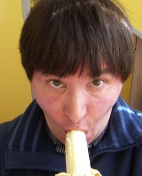Neologismophobia
Neologismophobia is the fear of having to deal with newly coined terms, words, or phrases, that may be in the process of entering common use, but have not yet been accepted into mainstream language. It is generally classified as an anxiety disorder of humans. In general, people who suffer from neologismophobia are very happy with words they find in their favorite dictionaries. If they encounter a word that is not, their adrenaline levels generally raise to exceptional levels. There are detection tools that can spot occurrences of neologismophobia because lemmata are missing in common dictionaries or encyclopedias. These tools are called neoflups. The origin of the word neoflup is totally obscure.
Many people who study dead languages have neologismophobic motives for that. Whereas living languages have vocabularies that are alive and that change over time, the dictionaries of dead languages are pretty much as dead as those languages themselves. There are terrorists who have it on their agenda, to introduce neologisms to dead languages, but so far such neologisms have only been developed in labs and none has been able to escape from a lab yet. A counterterrorism strategy against the introduction of neologisms to dead languages is the argument, that a language is by definition alive if it allows for the addition of neologisms to its vocabulary.
The normal procedure to create a neologism is by tossing tiles of the scrabble game and then checking whether the result is not too easy or too difficult to pronounce.
Neologismophobia vs. Neologism[edit | edit source]
Persons who do not practice neologismophobia to earn a living are called neologismophobes. If someone does earn a living with her neologismophobia, in general the phenomenon is not classified as an anxiety disorder but rather as a professional skill and the person is called a neologist. Neologists work for committees that decide whether words can be accepted to new additions of dictionaries or encyclopedias.
The neologist has various sources for the creation of new words. Traditionally, languages like Greek, Latin and Sanskrit are sources that are often used. A team of neologists normally decides by drawing straws, which candidates of a neologism is admitted to a dictionary. Clearly, all neologists are native speakers of the language that is involved. Bilingualism is strongly discouraged.
Various programs have been started that make an effort to rescue endangered languages by the introduction of neologisms into their vocabularies. Often, people are unable to adequately express their ideas and messages in those endangered languages as their vocabularies are unable to keep up with the rapidly changing society, and then it is natural to them to express themselves in languages like English, Spanish and French instead. Neologisms can enrich the endangered languages so that they are suitable for modern society.
For the creation of new words, there are various rules and guidelines, the most important of which are:
- A neologist must have pure motives. This implies that:
- She will not create very long neologisms in order to be able to use them in the game scrabble. The use of scrabble tiles is encouraged, though.
- She will never ever even try to introduce a neologism into the vocabulary of a dead language
- A neologism will never be a synonym of an existing word in the vocabulary
- It is not too difficult to pronounce and spell the neologism. Even though a neologism like jjngaarggthstvr has been accepted to the vocabulary of Nepalese in recent years, generally such neologisms are discouraged
- Credits will be given to the inventor of the neologism. This is recorded in the Archives of Neologism, a huge collection of documents that is kept at the head quarters in Salt Lake City.
Every newly appointed neologist must swear an oath, that she will never ever even try to introduce a neologism into the vocabulary of a dead language. This point is taken so seriously, that very severe penalties have been formalized in the laws of most countries in the world. Many a neologist has spent several years in jail for trespassing and in one case in the state of California, this even resulted the death penalty. Bounty hunters who chase neologists world wide to bring them to court are neologismophobes to the highest degree. Of course, the judges who condemn the neologists are neutral as far as neologismophobia is concerned.
Examples of neologismophobia[edit | edit source]
An example of neologismophobia is the fact, that certain scientists systematically avoid the term humasochism, and use terms like subtle masochism or humiliatory masochism instead, as the word humasochism is not in dictionaries of the year 2012 yet, even though the phenomenon itself dates back to pre-neandertal times. Related neologisms are humasochist and humasochistic.
Another example of neologismophobia is the avoidance of the word a4tj0pqut4oihj4. If this word would have been in a famous encyclopedia like the British Encyclopedia or Uncyclopedia, no one would hesitate to use it without reserve. Attempts have been made by neologists to introduce the word a4tj0pqut4oihj4 or variants of it like a4tj0pqut4oihj5 and a4tj0pqut4oihj6 into the vocabulary of the English language, but so far to no avail.
Famous people like John E. Kennedy and Theodore Rosegarden are known to have been neologismophobes. Thanks to them, the anxiety disorder is not classified as a psychological problem that needs psychiatric treatment anymore. In his book I beg you pardon? I never promised you neologismophobia of 1907, Theodore Rosegarden describes the role neologismophobia played in his life and professional career. The book is a defense of neologismophobia, in which plain pure English is advocated. Rumours have it, that John E. Kennedy was shot by a neologist, rumours that are spread by conspiracy theorists.
In fiction, neologismophobia is also a recurrent theme. In the movie The Matrix the main character is a neologismophobe, who tries to save the world agains Artificial Word Coining by AI robots. The name of this main character is Neo, a clear reference to neologismophobia. The actors in the movie all try to act very cool, tough and sophisticated, but deep down, all of them are really neologismophobes who have been selected for this movie based on this trait of character by the producer. In the end, just before he saves the world, Neo has a breakdown, crying: I will never be able to rid the world of neologisms which turns out to be the key for removing the very last neologism from the vocabulary of the very last language in the world. The cause of this is a global Artificial Euphoria in all the robots in the world, which burns down their circuits rendering them useless. In the film The Return of the Neologist a horror story is presented, in which the world is flooded by neologisms because of a global conspiracy of aliens that try to confuse humanity and sabotage human communication. As The Return of the Neologist is a trilogy and only parts one and two have so far been published, it is as yet uncertain whether the aliens succeed in their wicked deeds or not.
Extremes of neologismophobia[edit | edit source]
Some neologismophobes are so afraid of dealing with newly coined terms, words or phases, that they decide to be silent all day long, as they fear they may use a neologism by accident. Most neologismophobes that make this decision have joined monasteries or have settled in central regions of the Sahara and the Gobi Desert. Only very few neologismophobes are put in clinics. In general, neologismophobia is seen as a disorder that does not cause any harm to other people and that is innocent because of that. If a neologismophobe is put into a clinic, in most cases this is because of other things that do harm other people. Like humasochism, neologismophobia is seen as harmless to other people and therefore as acceptable or at least non-problematic for business procesess.

